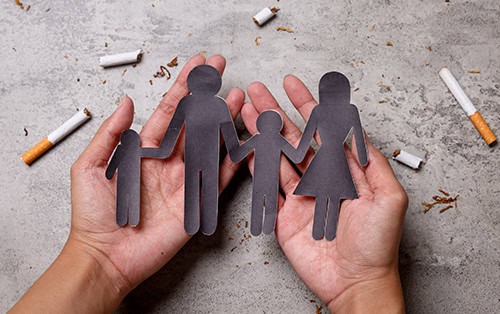Five Tips to Quit Smoking

We are all well aware of the ill effects of smoking, thanks to years of public education. But why do we still smoke then? Why do we persist in doing something that we know is harmful for us and those around us?
Some people use smoking as an emotional crutch – they light one up when they are stressed, angry, or upset.
And yet there are others who smoke as part of their daily routine, either after a meal or when their peers are doing so.
Mark Twain, an American writer, once said, “It is easy to quit smoking. I’ve done it hundreds of times.” However, truth of it cannot be further than that.
Nicotine is an addictive substance that evokes both psychological and physical withdrawal when one tries to stop smoking. It releases a chemical called dopamine, causing mood-altering changes that make a person feel temporarily good.

During an attempt to quit smoking, physical signs of nicotine dependency might surface, such as withdrawal symptoms for some smokers. The physical withdrawal can remit between two to four weeks.
This certainly sounds daunting to quit. But, the reality is that quitting is possible, and it is never too late to do so even if you have been smoking for a very long time. However, it is inevitable for your body to experience some withdrawal symptoms as your body adjusts to a non-smoking environment for the first time since you stopped smoking.

Quitting a habit is undoubtedly a big challenge, but it is never too late to take that first step. Here are five tips to help you quit smoking for good.
#1 Find a reason to quit
To get motivated, you need a personal, powerful reason to quit. Be it to protect your loved ones from second-hand smoke or lower your chance of getting lung cancer, heart disease, or other medical conditions. Choose a reason that is strong enough to outweigh the urge to light one up.

#2 Set a date and prepare yourself to quit
There is more to it than just tossing your cigarettes out. Smoking is an addiction. Without it, you will go through withdrawal. Choose a date to quit smoking and stick with it. Mark your quit date on the calendar for everyone to see. It’s a great way to be mentally prepared to stop smoking.
#3 Know your triggers
Triggers are things that make you want to smoke. Most triggers fall into these four categories: emotional, routine, social, and withdrawal.
Recognising your triggers is an important step on the road to becoming smoke-free.
#4 Build your support group
Tell your family, friends, and other people you are close to that you are trying to quit. They can encourage you to keep going, especially when you are tempted to smoke a cigarette.
#5 Seek Professional Help
Consult a healthcare professional for methods that will help, such as medication, counselling, or join a smoking cessation programme.



